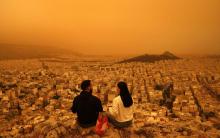Sahara
Storms hit the Sahara: A lake that was dry for 50 years is now full – Watch the video
According to the Moroccan government, in just two days of storms in September, some areas received as much water as would typically fall in an entire year.
A notable example is the village of Tagounit, located 450 km south of Morocco’s capital, Rabat, where 100 millimeters of rain fell within 24 hours.
Migrants face 'unimaginable horrors' crossing Africa says UN
Refugees and migrants face extreme violence, abuse and exploitation on land routes crossing Africa to get to the Mediterranean, with far more believed to be dying there than at sea, a U.N.-backed report said Friday.
Nearly 30,000 migrants have been declared dead or missing attempting to cross the Mediterranean to Europe in the past decade.
Greece: Rising temperatures & African dust engulf the country
The concentrations of African dust will remain high, mainly in the western and southern parts of the country
Weather: the African dust persists - How it will move until Tuesday, see the maps on video
Detailed forecast for the coming days in all regions - What is the "airborne" phenomenon that mobilises the African dust phenomenon
Weather: From Thursday... Summer is coming - 35 degrees in temperatures -What the meteorologists say
Instability with localised showers in most areas until Wednesday - African dust is favoured from Thursday
Time-lapse video captures dust clouds over Athens
The eerie, orange-hued phenomenon of the Saharan dust blanketing Athens during the week has been captured by a time-lapse video released by Meteo weather service of the National Observatory of Athens.
The images were recorded on Tuesday and Wednesday, when the dust cloud was at its strongest over Greece, before receding and moving further east.
- Read more about Time-lapse video captures dust clouds over Athens
- Log in to post comments
Saharan dust inundates Athens Wednesday morning
The African dust microparticles that blanketed southern Greece reached shocking concentrations in Athens of up to 700 µg/m3 on Wednesday morning when the European limit is 50 µg/m3.
The Saharan dust, called Minerva Red, started to recede as of noon, thanks to west-northwest winds.
- Read more about Saharan dust inundates Athens Wednesday morning
- Log in to post comments
Saharan dust covering Greece to subside on Wednesday
A major plume of Saharan dust that has affected much of Greece is expected to subside during the course of Wednesday, the National Observatory of Athens' DUST/METEO service said.
Prevailing west-northwesterly winds will gradually carry the dust toward the Aegean sea, while high concentrations are expected on Thursday over the islands of the Dodecanese.
African dust creates otherworldly atmosphere
Athens and southern parts of the country were again enveloped in Saharan dust on Tuesday, with hues of yellow and orange creating an otherworldly atmosphere.
The heavy concentration of dust particles affected most people with respiratory conditions "through the degradation of air quality," as pointed out by the Hellenic Pulmonary Society.
- Read more about African dust creates otherworldly atmosphere
- Log in to post comments
With dust to persist through Friday, experts warn of health risks
High concentrations of Saharan dust that enveloped most of Greece on Wednesday are to remain Thursday and Friday, heaviest in the west and south of the country. Experts warn that bacteria, fungi and pollen can be embedded in African dust, further affecting vulnerable groups.






